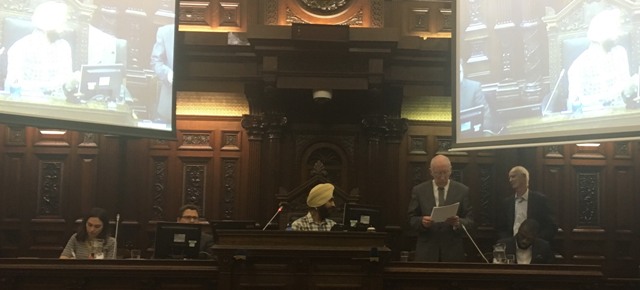 Debating UK-Commonwealth relations. [l-r] Alana Tomlin, Prof Nicholas Cheeseman, Jaspreet Singh, Keith Stokes-Smith, Richard Bourne, Darrel Blake. [photo: Surabhi Redkar]
Debating UK-Commonwealth relations. [l-r] Alana Tomlin, Prof Nicholas Cheeseman, Jaspreet Singh, Keith Stokes-Smith, Richard Bourne, Darrel Blake. [photo: Surabhi Redkar]
A debate discussing the role of Commonwealth and its potential for the UK was held at the Council Hall in Birmingham on 17 January, 2018. The turnout was a mix of Birmingham-based residents as well as students from universities such as Birmingham City University, the University Of Birmingham and Aston University.
The key agenda of this debate was to drive dialogue on the motion: “This House believes that the Commonwealth prevents the UK from moving on from the past and dealing with the future”.
President of Birmingham City University Students’ Union, Jaspreet Singh chaired the debate. Professor of Democracy, Nicholas Cheeseman from the University of Birmingham was a proposer of the motion with UOB student Alana Tomlin. On the opposition were Keith Stokes Smith, founding Chairman of the Birmingham Commonwealth Association accompanied by Darrel Blake, a Black Studies undergraduate student at Birmingham City University.
Professor Cheeseman opened the debate with some subtle but sly humour about the Commonwealth’s invisible presence, not just among people in the UK, but even among its member states. His strong points for proposing the motion included that the UK needed to focus more on building new relationships to break away from its past.
He said, “It (Commonwealth) is too small to be a political organisation and economically no replacement for the EU.”
Alana further backed up Cheeseman’s arguments with a few statistics about the low GDPs of member states and suggested UK nurture relationships with China, Japan for true development. The proposers hinted at being a part of Commonwealth seemed like a selfish move post-Brexit.
The argument for the Commonwealth
Keith Stokes Smith, on the other side, emerged powerful by saying that, “Past is past” and “We have a moral compass as a county”, reacting to the opposition’s claims about deep-rooted colonialism in the organization. He maintained that there is scope for the UK to better its chances and that the relationship with the Commonwealth would prove fruitful for that. Darrel’s personal account of fighting racism and now being a part of a UK university that is first in Europe to offer a degree in Black Studies outdid Alana’s statistics proposing the motion.
What came as a surprise were the opinions that came up once the debate was opened to the floor. People based in Birmingham supported the UK-Commonwealth relationship as a strong medium for cultural exchange. Those opposing the motion maintained that it is possible for UK to help Commonwealth member states, without being part of the organisation. Also, there were interesting insights from students hailing from Kenya and Africa where they compared the development of “colonised” vs “non-colonised” states and the contribution of the Commonwealth scholarship to their lives.
Although half of the audience had left before the final vote, only four people voted for the motion (“This House believes that the Commonwealth prevents the UK from moving on from the past and dealing with the future”). 24 voted against and there was one abstention. Clearly a vote of support for the Commonwealth from the city slated to host the Commonwealth Games in 2022.
Surabhi Redkar is a student journalist with the Birmingham Commonwealth Association.
You can also view the video of this debate:



